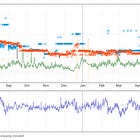What It Costs to Sell on Amazon (2023)
An intro to startup costs for new Amazon FBA sellers.
We’re back with another one in our “Getting Started” series covering Amazon costs. It’s one of the most common questions we see from those on the fence about starting a resell business or switching over from eBay.
There’s a common fear that the Amazon fees will eat you alive. This, of course, is ridiculous since you can accurately estimate your fees before you purchase your inventory.
In this article, we'll break down the major expenses, including: account fees, software, product, shipping, and other miscellaneous costs.
Amazon Seller Account Fees
First, you'll need to pay for an Amazon Seller Central account. This allows you to sell products on Amazon.
Amazon Professional Selling Plan: $39.99 per month
Yes, there is a free plan that adds an extra dollar fee per unit sold. But realistically, you should be using the professional plan within your first month selling.
Software Costs
Running an FBA business takes more than just an Amazon seller account. You'll need software to efficiently list products, analyze competition, manage inventory, and more. Here are some common FBA software costs:
Listing analyzer like SellerAmp or RevSeller: $15-20 per month
Keepa for product tracking: $20 per month
Repricing tool like Aura or Bqool: $50-100 per month
Inventory/Bookkeeping tool like InventoryLab or Quickbooks: $15-75 per month
If you’re starting bare bones, all you need is a listing analyzer and Keepa. As you start to move higher volume, InventoryLab would be next on the list. Then a repricer. Over time you may add more tools, but expect around $40 per month to start and $250 per month once you’re stable.
Pro tip: For existing sellers, audit your software expenses often. There’s a lot of shiny tools you might try out and then stop using. Don’t let them leach at your bottom line.
Product Purchasing Costs
Naturally, you need inventory to sell on Amazon. Product purchase costs vary widely based on your sourcing strategy.
If doing retail arbitrage, visiting thrift stores and discount retailers to find merchandise can require time and gas money. Sourcing wholesale products involves paying wholesale prices, which are lower but add up with large inventory purchases.
To ballpark, many new sellers invest around $500-1000 to purchase initial inventory when starting their FBA business.
Amazon Selling Fees
When your products sell on Amazon, the company takes a cut. These are the main fees to be aware of:
Referral fee - this is a percentage of the total sale price paid to Amazon. Ranges from 8-15% depending on the product category.
FBA pick & pack fee - Fees for Amazon to pick, pack, and ship your orders. Around $2-5 per unit.
FBA storage fees - Charges for storing your inventory in Amazon's warehouses. Varies by product size/weight.
FBA prep service charges - If using Amazon's prep services for labeling, packaging, etc. these services cost extra.
Amazon's fee calculator helps estimate total fees. Expect 15-30% of each sale to go to fees.
Shipping Costs
As an FBA seller, you cover the costs of shipping your inventory to Amazon's warehouses. This includes:
Cartons, bubble wrap, tape for safe packaging
Printer and label paper for FNSKUs
Pallet/freight costs or couriers if shipping larger quantities
You’ll likely Amazon partnered carriers which offer discounted shipping rates. Budget around $0.50-0.65/lb to ship inventory in. Plus less than a $1 per unit of prep for materials. Potentially more if you’re sending in prep intensive units such as fragile items.
Miscellaneous Costs
Some other costs that you may or may not need:
Accountant fees to handle taxes on sales and business write-offs
Business liability insurance in case of defects, lawsuits, etc.
Business licenses in states you operate
Trademark registration for branding assets and intellectual property (private label sellers only)
Registering your brand with Amazon Brand Registry (private label sellers only)
Total Costs
In total, you’re looking at ~$600-1100 in startup costs, with ~$80 in recurring monthly fees. Of course, you can increase the amount of startup inventory to your liking. Over time, your costs are sure to go up as you outsource specific services to virtual assistants, prep centers, accountants, staff, etc.
Regardless, it’s pretty incredible to think you can start a business with this little—especially compared to traditional businesses that would cost a minimum of $50,000.
Hope this helped and more startup posts to come.
More from BowTied Slinger
To get more Amazon FBA tips, follow BowTied Slinger on Twitter
To read more FBA guides, read the full Substack


